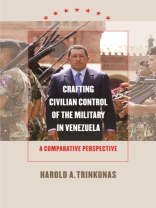Unlike most other emerging South American democracies, Venezuela has not succumbed to a successful military coup d’etat during four decades of democratic rule. What drives armed forces to follow the orders of elected leaders? And how do emerging democracies gain that control over their military establishments? Harold Trinkunas answers these questions in an examination of Venezuela’s transition to democracy following military rule and its attempts to institutionalize civilian control of the military over the past sixty years, a period that included three regime changes.Trinkunas first focuses on the strategic choices democratizers make about the military and how these affect the internal civil-military balance of power in a new regime. He then analyzes a regime’s capacity to institutionalize civilian control, looking specifically at Venezuela’s failures and successes in this arena during three periods of intense change: the October revolution (1945-48), the Pact of Punto Fijo period (1958-98), and the Fifth Republic under President Hugo Chavez (1998 to the present). Placing Venezuela in comparative perspective with Argentina, Chile, and Spain, Trinkunas identifies the bureaucratic mechanisms democracies need in order to sustain civilian authority over the armed forces.
Harold A. Trinkunas
Crafting Civilian Control of the Military in Venezuela [PDF ebook]
A Comparative Perspective
Crafting Civilian Control of the Military in Venezuela [PDF ebook]
A Comparative Perspective
购买此电子书可免费获赠一本!
语言 英语 ● 格式 PDF ● 网页 312 ● ISBN 9781469603643 ● 出版者 The University of North Carolina Press ● 发布时间 2011 ● 下载 3 时 ● 货币 EUR ● ID 6611695 ● 复制保护 Adobe DRM
需要具备DRM功能的电子书阅读器












